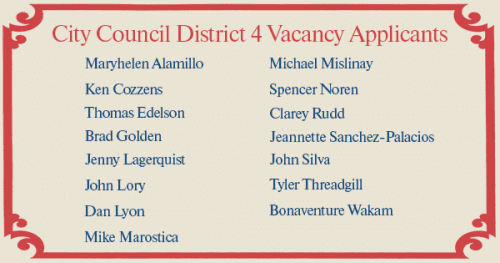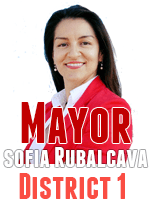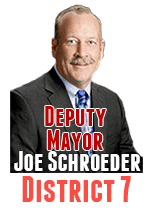Is The Council’s District 4 Replacement Plan The Best Solution?

“We are weary of politicians’ politicians. We want ours.”
—Gerald Stanley Lee, American author

On Saturday, February 20, 2021, the Ventura City Council will have the opportunity to select a new City Councilmember to join them for the next two years. This situation gives four of six City Councilmembers the power to choose a new Councilmember for the 15,000 residents living in District 4. Of course, none of the six remaining Councilmembers lives in District 4.
An Appointment Disenfranchises Voters
Several citizens emailed the Council claiming that appointing a replacement ‘disenfranchises’ the voters in District 4. If six members living outside District 4 appoint someone, District 4 is disenfranchised according to Webster’s definition, whether the Council believes it or not. Residents and Councilmembers should remember that the Ventura City Council can still function with six members and often does because of illnesses and vacations.
How We Got Here
Erik Nasarenko resigned his post as District 4 Councilmember because he was appointed Ventura County District Attorney. Mr. Nasarenko acknowledged his new role would not give him enough time to represent his district. It’s the first time since 1976 that a Ventura City Councilmember has resigned. Handling Mr. Nasarenko’s resignation has become a challenge, but the options are simple.
The Options To Fill The Vacant City Council Seat

On February 1st, the Councilmembers debated the various options open to them:
- Appoint a replacement to serve until November 2022. That individual could run as an incumbent in the next general election in November 2022.
- Leave the District 4 seat vacant until a special election in November 2021.
- Leave the District 4 seat empty and wait until the next general election in November 2022.
March and November are the only months the law allows special elections in 2021. Because the law mandates 88 days between calling for an election and voting, a March election was not an option because it was less than the 88 days.
After deliberating, the Council voted 4-2 to try and appoint District 4’s replacement. Councilmembers Jim Friedman and Doug Halter dissented.
The Argument To Not Appoint A Replacment
The resistance to fill the vacant seat with an appointment was mainly over two issues.
- There are concerns that the appointment will be a rushed process, influenced by political motivations.
- Any appointee will now have an advantage in the next general election by being anointed as an incumbent.
The Argument To Appoint Someone By February 25th
If the Council cannot appoint someone to replace Erik Nasarenko by February 25, 2021, the law requires the city to hold a special election.
Concern over leaving the District 4 seat vacant for ten months centers upon two other issues.
- Leaving the seat open may create a split 3-3 vote, causing a motion to fail.
- There is a concern that not having a representative for District 4 will leave those residences without a voice on the City Council.
Being Fast Versus Being Thorough With A Replacement
 The most practical option available to the Council was to appoint a replacement. Four of the Councilmembers didn’t want to wait for a special election in November 2021. Nobody wanted to wait until November 2022 to fill the vacancy because of the concern about not having a seventh vote to break any tie vote.
The most practical option available to the Council was to appoint a replacement. Four of the Councilmembers didn’t want to wait for a special election in November 2021. Nobody wanted to wait until November 2022 to fill the vacancy because of the concern about not having a seventh vote to break any tie vote.
Deputy Mayor Joe Schroeder summarized his choice this way. “I thought the best solution on the District 4 issue was an immediate special election; however, that wasn’t an option. I did not have issues with the associated expenses of a special election. I do have issues with running a City Council with an even number of seats. I believe it is a bad model of governance.”
If the Council cannot appoint a replacement by February 25, 2021, the law requires the city to hold a special election. The Registrar’s Office estimates a special election would cost $89,000 plus legal publication costs.
The Shortcomings Of Appointing A Replacement
There are three inadequacies of appointing a successor in District 4. Moving to district voting created the first and most significant of these shortcomings. Six Councilmembers—none of whom live in or have campaigned in the district—will decide who represents D4 for the next two years. These Councilmembers will say they understand the city’s needs at large, even though they represent specific districts. Yet, none of them can confidently say they know District 4’s particular issues or understand the wishes of D4 voters.
Second, the appointment will be based upon a 20-minute interview as opposed to a three-month campaign. All serving Councilmembers endured a lengthy campaigning process, which included appearing at Community Councils, candidate forums and campaign fundraisers. The appointee will do none of these things.
Third, the appointee will have the incumbency advantage in 2022 when he or she runs for re-election. Incumbent candidates are almost impossible to defeat in general elections.
The Process To Appoint District 4’s Replacement

As long as there will be an attempt to appoint a replacement for Mr. Nasarenko, the city wanted civic involvement in the selection process. Citizens were encouraged to submit questions for the candidates by February 8, 2021. Councilmembers proposed one question each. The final list of questions will include four questions from the public and six questions from the Council. The candidates to replace Erik Nasarenko will receive the questions in advance.
Selecting an appointee will take place on one grueling day. The Council will interview fifteen residents of District 4. Each will answer three questions from the City Council. The meeting day for choosing an appointee will be Saturday, February 20, 2021, beginning at 9 o’clock. The meetings will last twelve to fourteen hours.
The question-and-answer process will be virtual. The applicants will not be at City Hall, yet the interviews will be public. You’ll be able to see the proceedings over WebEx. (click here to watch on the day of the meeting). So will the candidates.
On that day, the first order of business will be for the City Councilmembers to select three questions to ask each candidate from the list of ten. Councilmembers will rank the candidates, deliberate and select the replacement.
Editors Comments
Because of the rush to interview and appoint, the process to find a successor in District 4 is possibly going to be little more than a beauty contest. An entire three-month election process gets reduced to a 20-minute Q&A session with the remaining Councilmembers.
 The logistics of the procedure are grueling for both the applicants and the City Council. Interviewing all fifteen candidates in one sitting will be wearisome. It’s hard to imagine that the Councilmember’s attention will be as sharp at the end of the day as it was in the beginning.
The logistics of the procedure are grueling for both the applicants and the City Council. Interviewing all fifteen candidates in one sitting will be wearisome. It’s hard to imagine that the Councilmember’s attention will be as sharp at the end of the day as it was in the beginning.
Selecting three questions on the day of the interviews leaves little time for the Council to reflect on what “good” answers from the applicants should be. And, since there will be no objective way of grading or evaluating the responses, it will be hard for the Council to debate one candidate’s relative merits over another.
The process to appoint favors the candidates whose interview is later in the day. All candidates will be able to watch the proceedings via WebEx. After the first interviewee, the remaining candidates will know exactly which of the ten questions the Council will ask. They’ll be able to practice their responses. They’ll see the other candidates’ answers and see how the Council reacts to those answers.
Those who are concerned about a 3-3 split vote should keep this in mind. The consensus is that if you can’t convince one more person to support your position, it was probably not a solid idea from the start.
In the end, the selection will come down to whom the Council likes best based on a 20-minute performance, and it may not be who will best serve District 4.
District Voting Complicates Matters
A lawsuit filed against the city forced Ventura to move to District Voting in the name of “fairness.” We’ve been through one complete cycle of district voting, and we have a Council with a different makeup than we had before.
Then came the opening in District 4. The Council has the opportunity to appoint someone to fill the spot—someone to their liking. They say they will, yet it’s unlikely since none of them live there or know the voters. Instead, they’ll appoint someone “like-minded” that lives in District 4. Now, they’re perpetuating a Council in their likeness.
Have all we’ve done is move from one good ol’ boy network to another?
Tell Your City Councilmember Who You Think The Replacement Should Be
Below you’ll find the photos of our current City Council. Click on any Councilmember’s photo and you’ll open your email program ready to write directly to that Councilmember.
 |
 |
|
 |
 |
|
 |
 |
|
 |
For more information like this, subscribe to our newsletter, Res Publica. Click here to enter your name and email address.

